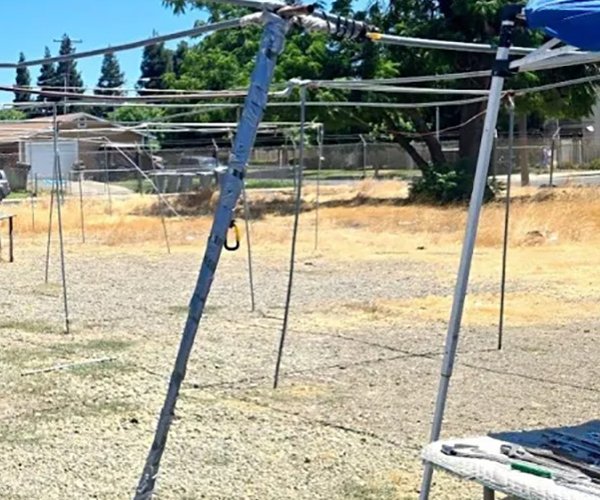BY RYAN SABALOW AND BRIANNA VACCARI
Special to the Journal
Editor’s note: This story was produced as a collaboration between CalMatters and The Merced Focus.
Lawmakers are poised to give California’s water districts legal cover from lawsuits as they work to meet strict new state standards for a cancer-causing toxic chemical.
It’s called hexavalent chromium, more commonly known as “chromium-6.” Drinking water with trace amounts of the chemical over long periods has been linked to cancer.
Last year, state water regulators approved a nation-leading drinking water standard for the chemical, which is found naturally in some California groundwater. In other areas, chromium-6 leached into the water from industrial sites.
The regulations are intended to protect more than 5 million Californians from the toxin, including in the Central Valley, Inland Empire and along the coast. Water districts say they plan to comply, but they complain the new rules are going to cost tens of millions of dollars, will jack up their customers’ water bills and could take years to complete.
They don’t want to spend even more ratepayer money defending themselves from lawsuits while they work to meet the new standards. Their concerns stem from the fact that they won’t be meeting state rules while upgrades to prevent contamination are underway. Water districts also would have to notify their customers that they’re not meeting the drinking-water standards, which the districts worry could create a wave of lawsuits.
Democratic Sen. Anna Caballero, whose sprawling San Joaquin Valley district includes water utilities affected by the new standard, heard their concerns.
Bottom of Form
She introduced Senate Bill 466, which aims to give water districts a break from spending ratepayer money on lawsuits as long as they’re making progress toward meeting their state-approved targets. The measure does not restrict state regulators’ enforcement authority.
“This just makes sense,” she said at an Assembly Judiciary Committee hearing last week. “It makes sure that they are protected so that they can put their resources to … bring(ing) the system up to their compliance plan.”
The bill passed the committee unanimously as it did the Senate earlier this year. It’s likely to be heard by the full Assembly after lawmakers reconvene in August from their summer recess.
Water districts support proposal
The measure has broad support from water districts across the state, including the city of Los Banos, which co-sponsored the bill.
Los Banos operates 11 wells to service 50,000 customers, and so far, the city has seen no evidence that its drinking water is dangerous to drink, Mayor Michael Amabile said.
Nestled just east of the Diablo Range, chromium-6 is naturally occurring in Los Banos’ ground water at varying degrees above the new state standards. During the winter, the city supplements its groundwater with surface water from the nearby Los Banos Creek, which sometimes brings chromium-6 levels down.
It would cost the city around $65 million in infrastructure to bring the city into compliance, Amabile said, which is half of the city’s annual budget.
“People shouldn’t be burdened just because of where they live,” Amabile said. “So if you’re on the east side of the (San Joaquin) Valley, you have absolutely no problems at all. If you’re on the west side of the Valley, you have all these issues.”
The city plans to comply with state requirements, but it’s not clear how the city is going to pay for the upgrades without financial assistance from the state, Amabile said. Any type of study that could propose a solution would take at least a year.
“I really don’t want to go down as the mayor that quadruples water rates, so I need the help from the state,” Amabile said.
At last week’s judiciary committee hearing, Scott Burritt, a representative for the Coachella Valley Water District, said the utility will have to spend $400 million to comply with the new rules – and that’s before anyone sues.
“Domestic water rates are expected to double,” Burritt told the committee. “This will have an enormous impact on the large disadvantaged communities that we serve, and it will also impact the retiree population, which is very large in our service area.”
The district provides drinking water to around 270,000 people in the Coachella Valley, which has naturally occurring chromium-6 in the area.
The influential lobbyists at the Consumer Attorneys of California opposed the original version of the measure, arguing it would have provided near total immunity for water districts, including if one had acted negligently.
“SB 466 grants public water systems a preemptive and absolute blanket shield from civil liability from negligence (such as causing cancer) related to drinking water with hexavalent chromium … so long as they are implementing — or even awaiting approval of — a compliance plan approved by the state Water Resources Control Board,” the attorneys wrote in a letter opposing the bill.
But Caballero, an attorney and former Salinas mayor, agreed to amend the bill last week to address the group’s concerns. The Consumer Attorneys’ spokesperson, Mike Roth, said the organization is satisfied with the changes, has removed its opposition and gone neutral on the bill.
Caballero has voted in accordance with the Consumer Attorneys’ positions on legislation 84% of the time, according to the Digital Democracy database.
The Erin Brockovich chemical
Hexavalent chromium was made infamous by the movie “Erin Brockovich.” The film dramatized Pacific Gas & Electric’s contamination of the water supply in the small California desert town of Hinkley.
Under the standards the state water board approved last year, water suppliers have to limit the chemical in water to no more than 10 parts per billion — equivalent to about 10 drops in an Olympic-sized swimming pool.
Levels above the new state limit have been reported in about 330 sources of drinking water in California.
Public health advocates say the new standard, while an improvement, doesn’t go far enough to reduce cancer risks. The new standard is one of the least protective of all the water contaminants regulated by California, according to a state analysis.
Under the new standard, for every 2,000 people who drink the water for a lifetime, one person would be at risk of cancer.
Some of the areas affected are the counties of Sacramento, Solano, Santa Cruz, San Bernardino, Santa Barbara, Monterey and Merced. The highest levels found were in Riverside, Yolo, Los Angeles and Ventura counties, although water suppliers may blend or treat the water to reduce the contaminants there.
The water board last year gave the largest water suppliers two years to comply with the new requirements; smaller ones with fewer than 1,000 connections were given four years. Those that can’t meet the deadlines must create state-approved plans that they’ll need to follow to come into compliance. They could be fined if they don’t.
In 2023, the California Air Resources Board also approved a ban on use of hexavalent chromium by the chrome plating industry.
CalMatters water reporter Rachel Becker contributed to this story.









